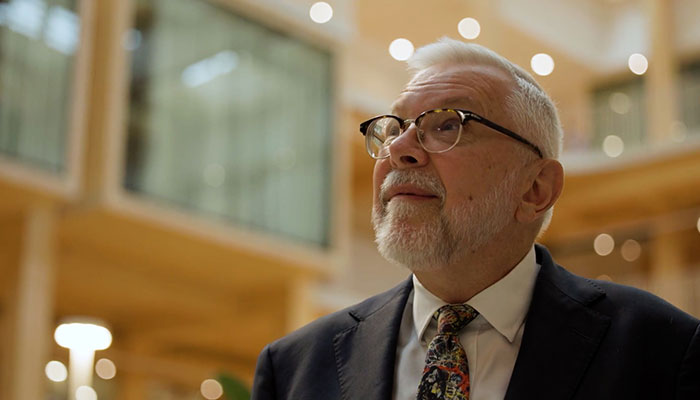Nearly half the people screened in the first rounds of the Australian Eye and Ear Health Survey (AEEHS) who said they did not have a hearing problem had some level of hearing loss when tested by audiologists.

The two-year survey will visit 30 sites across the country to screen hearing and vision in 1750 Indigenous Australians over the age of 40, and 3250 non-Indigenous Australians over the age of 50.
Inaugural Cochlear Chair in Hearing and Health at Macquarie University Hearing, Professor Bamini Gopinath, is leading the ear health component of the survey.
While about 400 of a planned 5000 people have been screened to date, she says the early results suggest there is cause for concern.
“We found 97 per cent of the Indigenous people and 91 per cent of the non-Indigenous people we screened had some level of suspected hearing loss,” she says.
“All the participants are asked if they think they have any problems with their hearing. Forty-six per cent of the people who answered 'no' to that question did in fact have some hearing loss.
“Many people don’t want to admit they have hearing loss, as there is still a high level of stigma attached to it.
“Another concerning factor is that more than a third of people with suspected hearing loss had never spoken to a healthcare professional about their hearing – and that included the people who knew they had an issue as well as those who were unaware.”
“We still have many more people to screen, but this data indicates there could be a high percentage of people with undetected hearing loss in Australia, and many are not getting the support they need even when they know they are having problems with their hearing.”
Why are people not having treatment?
While Australians have become used to having regular eye tests, fewer have routine hearing tests – and this is a cause for concern, given that midlife hearing loss is the single biggest modifiable risk factor for dementia diagnosis in later life.
Gopinath says there are many factors at play in why people either choose not to be tested or do not have treatment if they do become aware of a problem.
“Many people don’t want to admit they have hearing loss, as there is still a high level of stigma attached to it,” she says.
“It is often associated with ageing, and for this reason it can be hard for people to admit to themselves that their hearing is deteriorating, let alone acknowledge it publicly by wearing a hearing aid.

Concerned: Macquarie University's Professor Bamini Gopinath is leading the ear health component of the Australian Eye and Ear Health Survey and says early results suggest many people with hearing loss do not seek help.
“Some people think it’s a natural part of the aging process, so they accept their hearing is getting worse and assume there is nothing they can do about it.”
In some cases, she says a person may be tested but not get a hearing aid because of the cost; in others, they may have a number of health conditions, which pushes hearing down the list of priorities.
Risk factors and warning signs
In many cases, hearing loss is gradual, and changes can be difficult to detect, especially at the beginning.
Often, the first ones to notice hearing loss are the person’s companions rather than the person themselves, but there are warnings to look out for.
Some common signs include thinking things sound muffled, feeling people are talking too fast, struggling to understand or follow conversation, especially in noisy environments, having to ask people to repeat themselves, having trouble hearing when talking on the phone, and having to turn the TV up very loud.
You may also notice that you are watching others’ lips or gestures for hints to what they are saying, and focusing on conversation may be tiring or stressful, even to the point that you begin to avoid socialising.
Tinnitus (a ringing sound in the ears) and vertigo (the sensation that the room is moving around you) can also be indications of hearing loss.
Regular hearing tests are particularly important for these groups:
- Anyone aged 50 and older
Even if you don’t think you have any hearing loss now, it is useful to have a baseline test on file to measure against any future changes. - Anyone who spends a lot of time in noisy environments
People who work in industries such as mining, manufacturing, transport, storage and music are at particular risk, but some leisure activities, such as listening to loud music for long periods, can also be dangerous. Hearing loss caused by noise is cumulative, so it is important to protect your hearing by wearing earmuffs or ear plugs around noisy equipment and power tools, and limit time spent listening to music at high volumes. - Anyone who is prone to ear infections
Ear infections can damage the ear if left untreated, so make sure you seek medical advice.
About the Australian Eye and Ear Health Survey
The Australian Eye and Ear Health Survey is being led by the Westmead Institute for Medical Research and the University of Sydney, with partners the University of New South Wales, the George Institute for Global Health, the Brien Holden Foundation, and Macquarie University.
It is funded by the Australian Government Department of Health and Aged Care and Macquarie University.
The Australian Eye Health Survey was last held in 2015-16, and this is the first time that hearing has been included.
The findings will contribute to Australia’s commitment to United Nations and World Health Organisation resolutions to eradicate avoidable blindness, as well as fulfilling several key priorities and actions outlined in the Australian Government’s Roadmap for Hearing Health.
The next rounds of the AEHHS are taking place in Tamworth and the Blue Mountains in NSW.



